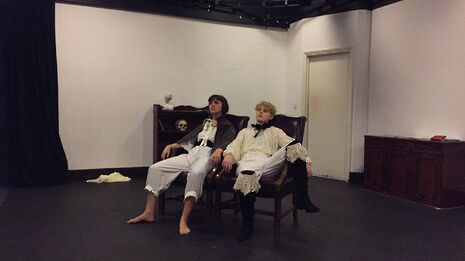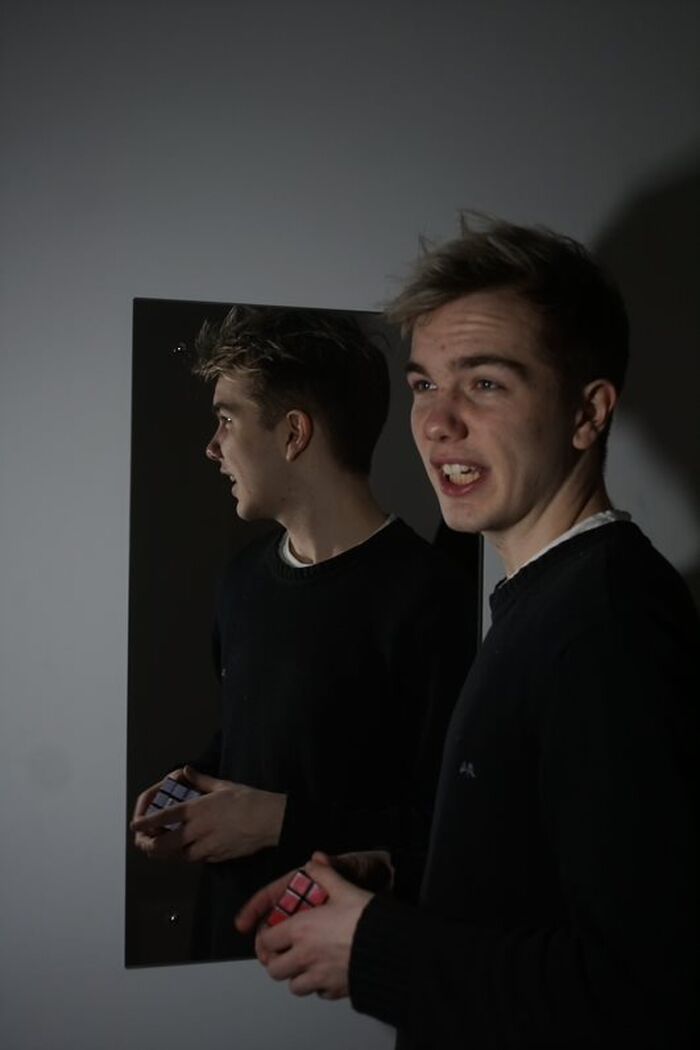Orlando review
This theatrical production of Woolf’s Classic captures the charm of the novel, but feels a little over-dramatised at times

Orlando is Virginia Woolfe’s fictionalised biography of Vita Sackville-West. In it, her close friend and lover is reconfigured as a beautiful, charismatic nobleman, whose whimsical and romantic adventures span five centuries and two genders. It is a charming and enduring novel whose lengthy prose and minimal dialogue Sarah Ruhl has skilfully adapted into a one-hour play.
"The use of physical theatre functions as a neat way to replicate the fluid, poetic motion of the narrative"
It is also a story very concerned with the visual, so it’s wonderful to see the clever detail in Mo Gillani’s set. Books, skulls, wrought mirror frames and a suspended silver dagger foreground the sense of the ethereal rubbing up against the tangible; while clusters of purple flowers and scarves are an elegant nod to the sapphic, also picked out in the purple tones of the makeup.
Indeed, Anastasia Joyce and Coral Dalitz’s makeup and costumes are a highlight. Details such as the glittering triangles under Sasha’s eyes and the purple heart-print on the Queen’s lips are deft and mesmerising touches; the combination of which suspends us between the tale’s grand, sometimes grave settings and the romantic, childlike imagination of young Orlando.
The visual intrigue of the piece extends to the actors’ use of physical theatre, which the chorus use to create the setting; become props, and enter and exit the story as new characters. It is a neat way to replicate the fluid, poetic motion of the narrative and, when it goes smoothly, it is seamless.
At other times, however, this very stylised physical theatre feels overused, and the constant movement and noise of footsteps becomes distracting. When combined with frequent loudness and shouting the effect can be thrilling and humorous at effective points, but risks becoming tiring and repetitive at others. Moments of stillness are rare but, when they do arrive, create a profound and delicate intimacy which works especially well in the Corpus performance space.
It is the same issue of balance with the chorus. When performing separate characters, this talented foursome demonstrate a witty and energetic command of the script. Each chorus member plays roles in the narrative with physical and vocal flair, and here stylised caricatures (such as Alice Tyrrel’s Queen) can work to wonderful effect. Juliet Martin has a particularly effective Eastern European accent and balletic gait as Sasha.
However, when all four perform together, and especially during the long passages of chorus narration which form the script’s backbone, the combination of large, expressive performances feels overwhelming and heavy-handed, until Orlando’s more reserved naturalism is swamped. Despite this, when Georgina Taylor’s Orlando does come to the fore, she carries a deliberate, twinkling presence which gracefully navigates the story’s evolution.
Phoebe Segal’s Orlando does a good job of capturing the fascination and charm of Virginia Woolfe’s novel, aided by thoughtful visuals and some effective choices of music. The play succeeds in holding in tension the male and the female, the youthful and the ageing, and the blissful and the painful. Where Orlando could become more enjoyable is if it managed to do the same with the dramatic and the restrained.
 News / CUP announces funding scheme for under-represented academics19 December 2025
News / CUP announces funding scheme for under-represented academics19 December 2025 News / SU reluctantly registers controversial women’s soc18 December 2025
News / SU reluctantly registers controversial women’s soc18 December 2025 News / Cambridge welcomes UK rejoining the Erasmus scheme20 December 2025
News / Cambridge welcomes UK rejoining the Erasmus scheme20 December 2025 Features / Should I stay or should I go? Cambridge students and alumni reflect on how their memories stay with them15 December 2025
Features / Should I stay or should I go? Cambridge students and alumni reflect on how their memories stay with them15 December 2025 Film & TV / Timothée Chalamet and the era-fication of film marketing21 December 2025
Film & TV / Timothée Chalamet and the era-fication of film marketing21 December 2025










